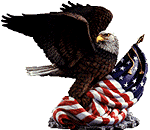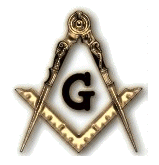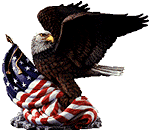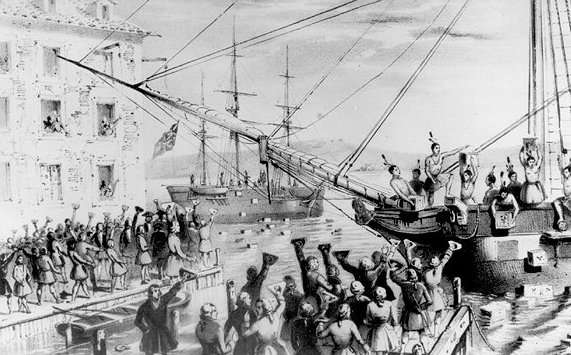 |

|

|
Freemasonry and Patriotism
Written by:
Wilfred G. "Bill" Soutiea, Jr., Grand Master (1999-2000)
Grand Lodge of Ancient, Free and Accepted Masons of the State of Missouri
and
Phillip G. "Phil" Elam, Grand Orator (1999-2000)
Grand Lodge of Ancient, Free and Accepted Masons of the State of Missouri
(Undelivered Grand Oratory for the 179th Annual Communication of the Grand Lodge of Missouri.)
|
What is patriotism -– this almost universal instinct for which more men have given their
lives than for any other cause, and which counts more martyrs among its ranks than religion itself?
What is this potent sentiment that has produced so many great and splendid
deeds of heroic bravery and unselfish devotion? What is this driving force that has fostered liberty,
won independence, and advanced civilization? The dictionary tells us that a patriot is “one whose ruling passion is the love of his country,” and that patriotism is “love and zeal for one’s country.” John Paul Jones, a most worthy Freemason, and America’s first naval hero, called himself “a citizen of the world.” Though a Scotsman by birth, he fought for the Colonies because he believed they stood for a broader form of patriotism than had ever before been attained by any group of men. He stood for America because he regarded America as standing for “man as man.” Love of country is a most noble passion, but love of man, as directed by the Great Architect of the Universe, is even more noble. Patriotism is founded on great principles and supported by even greater virtues. It involves duties and responsibilities as well as privileges. The idea of patriotism involves personal sacrifice. Our obligations do not simply begin with obedience to law and end with payment of taxes. These things are compulsory and involuntary evidence of our love of country, because the police insist on the former, and the Treasury Department takes good care of the latter. True patriotism is, however, a thinking patriotism. It is a sacred entity. No noise, however great, no shouts, however thrilling, no hurrahs, however enthusiastic, no blare of brass bands, no flaming fireworks, or no strenuous stump speeches can begin to tell what true and genuine patriotism is really about. True patriotism is a great, calm, and altogether lovely and holy thing, that worships God and loves its fellow men. It is a consecration of high ideals, and it is the hallowing of a man’s entire soul in a most holy cause. Americanism can easily be defined by the Declaration of Independence, which, basing its doctrine upon the “Laws of Nature and of Nature’s God,” asserts the rights of man in one immortal sentence.
No Freemason who reads those words, and those in our Bill of Rights and Constitution, would fail to recognize them as Masonically-inspired documents – not because of the great number of Freemasons who wrote or influenced them, but because they embody the living and time-honored tenets, precepts, and principles of our Ancient Craft. We Americans are the freest people on the face of the earth. Our strength rests in our patriotism, and anarchy flees before its Shining Light. Peace, order, security and liberty are safe so long as love of country burns bright in the hearts of our people. How can we justify our love of our own land? Only in this way – each nation, each race has a genius of its very own. Judea was no larger than Illinois, and yet it gave to the entire human race its loftiest and truest religion. Greece was a tiny land, bordered by violent seas, but it added an immeasurable wealth of art, drama and philosophy to the world. So, too, did ancient Rome. We could call the role of nations, asking of each what it had or has to give of Beauty and of Truth to mankind. Each country will have its own contribution, and the citizens of that country should be justly proud. Even so, our country has a genius that is truly unique. What is that service to mankind if it is not to show, not only “government of the people, by the people, and for the people shall not perish from the face of the earth,” but that it is the highest ideals in government, and that it makes for the greatest happiness of man, both in private nobility and public welfare? Of that genius and service our flag is the emblem, and loyalty to that emblem is demonstrated in our devotion to it. As Freemasons, our field is the world, but our solicitude is to our own country – as it makes its unique and priceless contribution to universal good. With due reverence for other nations, and by loyalty to our own flag, we best serve the human race. No country can be ever be wholly without men of the old heroic strain and stamp, whose word no man would dare to doubt, whose virtues shine resplendent in all calamities, reverses, and amid all temptations, and whose honor glitters as purely and perfectly as the most valuable gem. These are the honest men who are not the slaves of material occupations and the pleasures of life. Every generation, in every country, will bequeath to those who succeed it splendid examples and great images to be admired and imitated. The famous examples throughout our nation’s past, the memories and immortal thoughts of our great and wise thinkers, statesmen and heroes, are the invaluable legacy of that Past to the Present and the Future. They are the chief elements of our national wealth, glory, prosperity and immortal renown. Every Freemason in these United States should understand that Freemasonry, as an institution, has always been an integral part of America’s history and destiny. An understanding of this will enable any Freemason to accurately state the relationship between Freemasonry and Americanism. His life and example should evince the fact that to be a good Freemason is to be a good American. For Americanism, we are most proud to proclaim, is the latter day effort to embody our age-old Masonic idealism into law and practice for the just governing of an entire nation. It was Freemasonry in a pre-eminent degree that so tenderly, and yet so resolutely, cradled democracy in the first eventful years of America’s history. In confirmation of this fact, we need mention only a few of the many illustrious names written on the pages of both Masonic records and American history – names like Wor. Bro. George Washington, Most Wor. Bro. Ben Franklin, Most Wor. Bro. Joseph Warren, and Bro. Lafayette, the hero of two countries! We fail to grasp the full significance of the noble record of those selfless and illustrious Brethren of our Order who took such prominent roles in Revolutionary days if we see it only as a source of pride and gratification. It is all of this, of course, but it is much, much more – for every page of America’s early history imposes duty, obligation and responsibility. If it is true, and records indicate it as such, American nationality was largely brought about by Freemasons, and that to this end, the energies of the entire Craft were devoted to this grand cause in the trying times of the Revolution. If our predecessors gave ‘their lives, their fortunes, and their sacred honor” to start our Republic on its glorious path, surely we can best honor and prove true the traditions of American Freemasonry by continuing the work they began. Our advantages, if not our opportunities, are even greater than theirs. The small and isolated Fraternity of that day has become a powerful Order – and it can exercise a mighty leverage for civic progress and reform. The most noble lesson taught us by the Freemasons of the American Revolution is this: To place patriotism above partisanship, to preserve and extend the free institutions of the Republic, to maintain the honor and dignity of the Nation at home and abroad, and to realize the lofty ideals of our Eighteenth Century Brethren, bequeathing them as a priceless national heritage for generations of Americans yet unborn. Freemasons, who teach so much by symbols, point with pride to the part Freemasonry played in establishing the greatest symbol known among all free nations – the Stars and Stripes we so fondly call “Old Glory.” The most sacred symbol of any people is their flag, and in an hour of crisis and destiny, the old emblem becomes instinct with all of its lofty and holy meanings. In that flag is the soul of each nation, the outward and visible sign of its invisible and invincible spirit. The very body and blood of a free people are in the folds of its flag, and when it is unfurled, the soul of the nation stands proudly erect. Just what suggested to Washington the stars and stripes can never be known because he never referred to the matter in any way. On January 1st, 1776, when the new army was organized, a “Union” flag was raised which gave the British much mirth and joy because it was, at that time, the flag of British India. Whether Washington knew this to be a fact or not is unknown, but the “Cambridge Flag” was his idea, and raised on his order. Later, in Philadelphia, with independence in sight, he knew the flag would have to be changed and made a drawing of its revision. He was taken to Betsy Ross, wife of Master Mason John Ross, who was killed during the Revolution, and it was she who made the first flag with white stars on a blue field, in addition to the thirteen red and white stripes. These stars were arranged ten in a circle, with an eleventh star as a point in the center. Historical evidence shows that Washington again acted on his own initiative and authority as Commander-In-Chief of the Revolutionary Army. On June 14th, 1777, Congress officially adopted this flag, changing the number of stars to thirteen and arranging them in a circle. The wording of this famous resolution is as follows:
It is said that our Flag was born in 1777, but that cannot be totally true. Yes, it was stitched into form at that time in a little back parlor, but he who would know its true origin must look back into the dim, but aspiring past of mankind. It was woven on the ancient looms of antiquity – woven of the dreams and hopes of humanity – by a Great Hand stretched out from the Unseen. All those who, on the red fields of war, died that their sons might be free; all who in dark prison cells suffered for the rights of man; all who in the long night of tyranny toiled and prayed for a better day – it was they who added the first threads to our beloved Flag. Our Flag floats today in the blue sky, swayed by the breath of God, and held aloft by innumerable hands of the living and the dead as an icon of history and prophecy. The colors blend in our Flag to make it the sanctifying symbol of Unity, Fraternity and Goodwill among men. It is the Flag of Freedom and Friendship woven of the mystic cords of memory, stretching from every battlefield and patriot grave to every living heart and hearthstone all over this broad land, proclaiming the time-glorified principles wrought out by the tears, prayers and blood of our early American forefathers. As Freemasons, we can fully appreciate the words of President Calvin Coolidge:
Let those who stand under it join hearts in one faith, and join hands in one united purpose – for the safety and sanctity of this glorious Republic; for the rights of man and the majesty of law; for the moral trusteeship of private property and public office; for the lifting of poverty, through self-help, to comfort; for the dignity of the home and the laughter of little children; and for social beauty, national glory, and human welfare. Long may it wave, rendered for all ages by the Holy Faith of the men who lifted it up, and the valor of the men who defended it in an hour of madness and peril. May it ever float over scenes of peace, honor and progress. Is it any wonder that the old soldier loves the Flag under whose folds he fought and for which his comrades shed so much blood? He loves it for what it is and for what it represents. It embodies the purposes and history of America itself. It records the achievements of its defenders upon land and sea. It heralds the heroism and sacrifices of our Revolutionary Fathers who planted free government on the soil of this continent and dedicated it to Liberty forever. It attests to the struggles of our rag-tag and woefully outnumbered Revolutionary Army, and the valor of our citizens in all of the wars of our Republic. It has been sanctified by the blood of our best and bravest. It records the achievements of Washington and the martyrdom of Bro. Nathan Hale. It has been bathed in the tears of a sorrowing people – and it has been glorified in the hearts of freedom-loving people, not only at home, but in every part of the world. Our Flag expresses more to us than any other national symbol. It expresses the will of a free people, and proclaims that they acknowledge no earthly sovereign. It was never assaulted that millions did not rise up to “smite their assailant hand and foot.” Wherever there is a constitutional government that respects the rights of men, Freemasonry is the loyal supporter of that government. Patriotism, loyalty to government and to our Flag, is found running through every Masonic degree. The Masonic formula for Brotherhood rests upon the identical principles that were indelibly written into the Constitution of the United States. Loyalty to one’s country is a basic Masonic principle, yet, for many, this is construed to refer only to times of war and national crisis. Loyalty carries with it the highest obligation of citizenship – obedience to law, respect for constitutional authority, a recognition of the right of every human being to the enjoyment of life, liberty and the pursuit of happiness. The rights we enjoy as citizens carry with them corresponding duties. Among these duties is the careful and intelligent consideration of men and measures coming before the people for approval in our nation’s electoral process. No good Freemason will fail to be a good citizen, and to be found on the side of decency, civic righteousness, and public order. Each American, including Freemasons, must learn from the insights made by our Brother Douglas MacArthur in his last address to the Corps of Cadets at the United States Military Academy at West Point in 1962 as he accepted the prestigious Thayer Award. They are:
Freemasons preach and firmly believe in the right to think, the right to speak, the right to worship in freedom and as conscience alone shall dictate, but how many Freemasons truly know what these things mean – how many really believe in them? How many believe in them so firmly that they are willing to fight for them, live for them, and die to defend them if need be? These things, when mentioned, sound decidedly like those principles of Americanism the soldiers, sailors and airmen of our country so nobly protect. If our Masonic Fraternity stands for these principles, whole-heartedly and unafraid, then we should use our Beloved Order as the greatest force of all time for the continued up-building of America – individually, one Brother at a time. The real challenge to us as Freemasons is to prove our worth and show cause why our Ancient Order should continue to exist in today’s society. The cry of the hour within Freemasonry is for leadership – leadership within both our Lodges and our communities. Committed and moral leaders who will do “the right thing,” and who are not afraid to show their patriotism and love of country. Leaders who are so filled with inspiration and consecration to the development of true citizenship – for the sake of America — that they will forget both self and self-interest to work for the further attainment of the very Masonic principles on which our country was founded. As Freemasons, we need, as never before, a clear and commanding conception of what America really means. It would be a poor Freemason, and no patriot at all, who has not asked himself what plan, what purpose, what prophecy the Great Architect of the Universe is trying to work out through our national destiny. Surely, America exists to build in the new world a community based upon the God-given principles of Brotherly Love, Relief and Truth – a community united, just and free, where men of every race and creed may live and live well because they freely choose moral fellowship under a sense of common interest and obligation. Commitment to that ideal is true patriotism, and, perhaps, that is the greatest gift Freemasonry can give to the world as we step into the 21st century and a new millennium. The histories of America and of Freemasonry have always been inseparably intertwined for the betterment of mankind and to the glory of the Supreme Grand Master of the Universe – and may it ever be so. Finally, we would like to share some words thought to have been written by an unidentified Revolutionary soldier and Brother Master Mason. It is a simple, yet profound, prayer written by the very type of man and Freemason that made this country great, and describes the purpose of Freemasonry better than the most eloquent orator could ever hope to do. These are inspirational words that every Freemason working in the quarry of life can live by, and words that demonstrate the true patriotism of a simple soldier who looked beyond his own needs even in the hardest and most dangerous of times:
“Prepare our hearts in sympathy to be partners in suffering with the weak; partners in eager service with the strong. “Reveal to us the wavering ranks of those that are struggling upward that we may cheer and support our comrades unknown. Remove from us the love of glory and the thirst for praise. Give us, in weariness, refreshment, and in strength, peace; but when we are idle, send shame, and when we are false, send fear, to bring us back to Thee. By Thy Love restrain our censorious speech and teach us to commend. By Thy Divine Wisdom enlighten our plans, and direct our endeavors for the common wealth. And give to us the vision of that bright City of God, the New Jerusalem upon Earth, where all men may share the best they have, in thought and in deed, and where none shall harm or make afraid. “And establish Thou the work of our hands; yes, the work of our hands establish Thou it.” To these stirring words from the innermost desires of this early American patriot and Freemason for both his young country and for all of mankind, we can only most humbly add –
 |

|

Masons of the State of Missouri. All rights reserved.